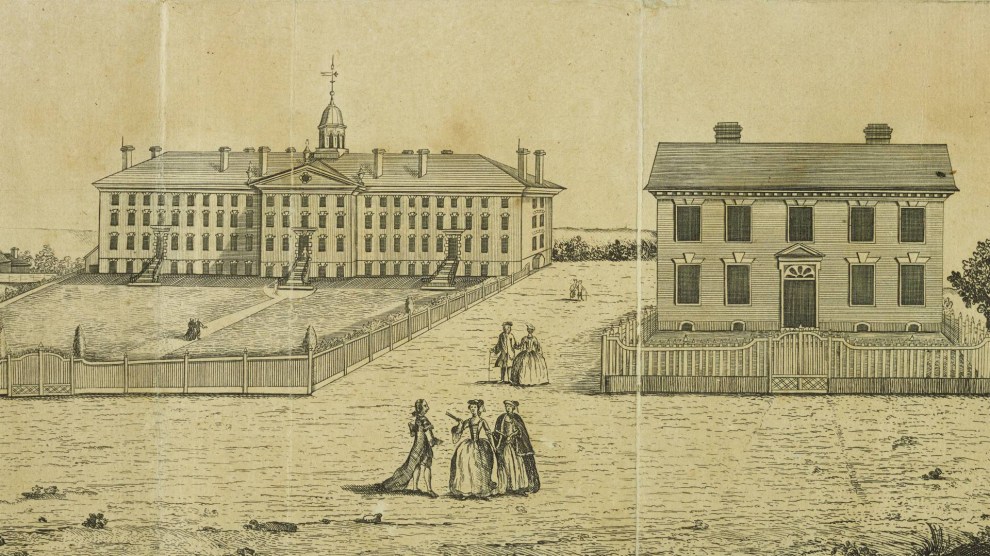
Kentucky Republican state Rep. Jennifer Decker told a local NAACP chapter on the first day of Black History Month that her white father was a "slave"—before later admitting she "probably overstated," according to a local report.Jon Cherry/Getty
A Kentucky Republican politician made an audacious claim on the first day of Black History Month, according to a local report: her white father, she said, was a slave.
State Rep. Jennifer Decker made the comments, first reported by the Louisville Courier Journal, while speaking to a local chapter of the NAACP on Feb. 1 about why she’d introduced a bill seeking to eliminate diversity, equity, and inclusion initiatives at public colleges and universities, which she has said make schools “more divided, more expensive, and less tolerant.” According to an audio recording of the meeting obtained by the Courier Journal, during the Q&A portion of the event, an audience member asked Decker if her family played any role in the slave trade.
Per the Courier Journal, Decker replied: “My father was born on a dirt farm in Lincoln County. His mother was the illegitimate daughter of a very prominent person who then was kind enough to allow them to work for him as slaves. So, if you’re asking, did we own slaves? My father was a slave, just to a white man and he was white.”
When a Courier Journal columnist tracked Decker down to ask what she could have possibly meant—given that white people were not, in fact, subject to the chattel slavery that millions of Black people endured on American soil for more than 240 years—she tried to brush off the reporter before seemingly walking back her originally comments.
“Irrelevant, irrelevant.” Decker initially told the reporter about her initial comments, adding, “my father’s past poverty is a great equalizer.”
When the reporter persisted, Decker explained that her father—a preacher born around 1933, according to the Courier Journal, or 68 years after slavery was outlawed—was “born into poverty” and worked for free with his family on the property they lived on. (It’s unclear whether the adults were paid, though the Courier Journal notes that it sounds more like “Decker’s father was forced by his parents to do chores” and that the family were tenant farmers.)
Decker eventually conceded that she “probably overstated. Was I saying that it was kidnapping and abuse the same as the slaves? No.”
That’s one thing Decker is right about. As my colleague Garrison Hayes discussed with Nell Irvin Painter, Princeton historian and author of The History of White People, back in October, there is a historical difference between white people who worked as indentured servants and the centuries-long enslavement of Black people on American soil. As Painter explained:
Irish people—and vulnerable English people, Scottish people, Welsh people, poor people, people considered criminals, or orphans—were often shipped outside of the British Isles to places like what became the United States, and what later became Australia and New Zealand, as indentured workers. There were lots and lots of unfree white people. But their unfreedom had a term limit. If you survived your indenture—and many, many, many people did not survive—then you could become a free person.
So yes, many early North American white people were unfree, but they were not enslaved for life. It took the North American colonies several decades to go to permanent enslavement. It didn’t happen overnight. The people whom warlords had rounded up in places like what is now Angola and sold to Europeans, it was their descendants who became permanently enslaved. So by the end of the 17th century, what we recognize as permanent servitude, that chattel slavery, was in place. And it did not include people we now consider white.
Ricky Jones, a professor of Pan-African Studies at the University of Louisville, was one of many readers who called Decker out for the ahistorical comment.
“A white slave in the mid-20th century? Talk about recreating history!” Jones wrote in a post on X. “Maybe this makes sense in the alternate supremacist reality that is Kentucky, but nowhere else. Jennifer Decker and her Republican friends lie about and distort everything else, why not this?”
While shocking, Decker’s comments—and her political priorities—are not anomalies. Republicans across the country have been seeking to downplay the history of Black enslavement and abolish DEI initiatives and critical race theory in schools for years now (though CRT is a framework for legal scholarship that is not, in fact, being taught to six-year-olds). But still, as the Courier Journal columnist pointed out, comments like Decker’s are exactly why it’s so important for schools to teach diverse curricula about the real history of slavery and racism in the US—which is exactly what she’s fighting against.
Decker and a representative of the local NAACP chapter she spoke to didn’t immediately respond to requests for comment on Tuesday afternoon.

















